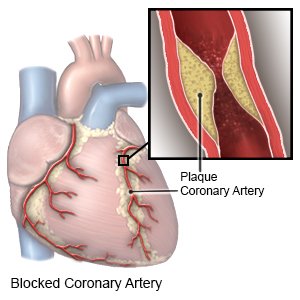Atherectomy
Medically reviewed by Drugs.com. Last updated on Aug 4, 2025.
WHAT YOU NEED TO KNOW:
Atherectomy is a procedure used to remove plaque that narrows or blocks your arteries. Plaque is fat, cholesterol, or tissues that build up on the inner artery wall. Blood flow is decreased when plaque builds up and narrows the arteries. Decreased blood flow can cause chest pain or a heart attack.
 |
HOW TO PREPARE:
The week before your procedure:
- Arrange to have someone drive you home after the procedure.
- Tell your healthcare provider about any allergies you have. Tell him or her if you have ever had an allergic reaction to local anesthesia.
- Tell your provider about all the medicines you currently take. Include prescription and over-the-counter medicines, vitamins, and supplements. Your provider will tell you if you need to stop taking any of these before the procedure, and when to stop. He or she will tell you which medicines to take or not take on the day of your procedure.
- You may need blood tests, an EKG, or a chest x-ray before your procedure.
The night before your procedure:
You may be told not to eat or drink anything after midnight on the day of your procedure.
The day of your procedure:
- Take only the medicines your healthcare provider told you to take.
- You or a close family member will be asked to sign a legal document called a consent form. It gives healthcare providers permission to do the procedure or surgery. It also explains the problems that may happen, and your choices. Make sure all your questions are answered before you sign this form.
- Healthcare providers may insert an intravenous tube (IV) into your vein. A vein in the arm is usually chosen. You may be given liquids or medicine through the IV.
- Local anesthesia is a shot of medicine put into your skin to numb the area and dull the pain. You may still feel pressure or pushing during the procedure, but you should not feel pain.
WHAT WILL HAPPEN:
What will happen:
A small incision will be made in your groin, arm, or wrist. A catheter will be inserted into your artery and moved to the blockage. You may be given dye so your surgeon can see the blockage clearly. He or she will use a cutting device to remove the plaque from your artery. Your incision will be closed with stitches.
After your procedure:
You will have a bandage or pressure device on your incision to prevent bleeding. Do not get out of bed until your healthcare provider says it is okay.
CONTACT YOUR HEALTHCARE PROVIDER IF:
- You have a fever.
- You get a cold or the flu.
- You have questions or concerns about your procedure.
Seek Care Immediately if
You have any of the following signs of a heart attack:- Squeezing, pressure, or pain in your chest
- You may also have any of the following:
- Discomfort or pain in your back, neck, jaw, stomach, or arm
- Shortness of breath
- Nausea or vomiting
- Lightheadedness or a sudden cold sweat
Risks
Your artery may be damaged or tear. Your arteries may become completely blocked during the procedure. This stops blood flow and may lead to a heart attack. You may need coronary artery bypass graft surgery. You may get a blood clot in your limb. This may become life-threatening.
Related medications
Care Agreement
You have the right to help plan your care. Learn about your health condition and how it may be treated. Discuss treatment options with your healthcare providers to decide what care you want to receive. You always have the right to refuse treatment.© Copyright Merative 2025 Information is for End User's use only and may not be sold, redistributed or otherwise used for commercial purposes.
The above information is an educational aid only. It is not intended as medical advice for individual conditions or treatments. Talk to your doctor, nurse or pharmacist before following any medical regimen to see if it is safe and effective for you.
Learn more about Atherectomy
Care guides
Further information
Always consult your healthcare provider to ensure the information displayed on this page applies to your personal circumstances.
